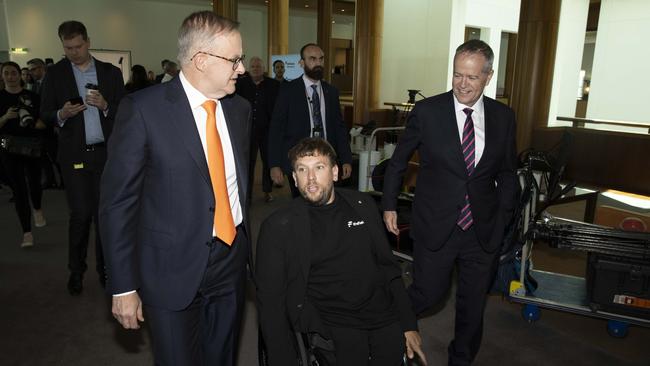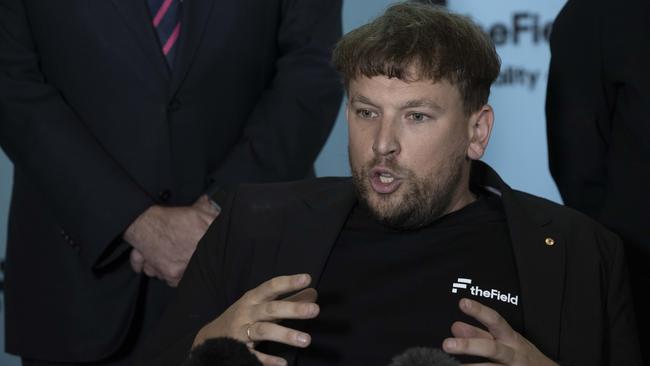
At the National Skills and Job Summit in Parliament House a few weeks ago, Alcott put his charisma to great use as he argued – inside and outside the hall – for those employers who were lamenting a lack of labour to hire from the untapped pool of people with disabilities.
This week, with the help of a $6m federal government grant, Alcott launched an online jobs platform called The Field (www. the field.jobs) to connect employers and potential employees and give “businesses a clear pathway to people with disability who want work, across all industries, roles, and levels of experience”.
There is plenty of potential upside in Alcott’s campaign to get more people with disability in jobs. There are 2.1 million Australians who identify as having a disability and are of working age. As well as being a connection point, the new job site will have digital resources to help companies develop inclusive work practices. Candidates will also have a better chance of matching their skills set to available jobs when they are posted.

With Alcott’s profile, The Field looks like a fine idea, in practical and consciousness-raising terms. But it’s clearly only part of the answer to this country’s pretty ordinary effort in employing people with disabilities, despite the fact Canberra pours more than $1bn a year into trying to get us to do just that.
The unemployment rate for people with disability is more than double that of working-age Australians, and our levels (well below the OECD average) have not improved for decades.
Yet it’s not the fault of business, says one of the most experienced operators in the sector.
Laura O’Reilly, co-founder of non-profit Fighting Chance, says employers are enthusiastic about hiring for diversity and there are a range of ways that prospective employees and employers “can find each other”.
The big challenge, she believes, is “making sure that when the person with disability lands the job, that they’re fully job ready and that the job they are going to is a good and sustainable match”.
Often, O’Reilly says, there is not enough preparation done upfront and it winds up as a bad experience for both parties.
“We know in the traditional system, only about three in 10 people are placed in sustainable employment and we see in many cases it’s the lack of preparation and careful matchings that’s the issue,” she says.
It’s perhaps not surprising that with all the goodwill in the world, some people with disability are not “job ready”. For years, many have been told they will never work. Few have had any work experience during their school years. They have never done the paper round, or worked in a cafe, for example. A direct entry to mainstream employment can be daunting, even at a time when the public support for and understanding of the rights of those with disability is high.
One model designed to help candidates become job ready is that set up by O’Reilly and others within Fighting Chance in 2014. Their social enterprise Jigsaw trains and employs people with disability for up to two years before supporting them into mainstream jobs. Jigsaw’s philosophy is “prepare for work, through work” and it partners with more than 100 corporate clients such as Westpac, Allianz and Australian Unity.
Says O’Reilly: “The simple goal is, when we come to put someone in that mainstream job they’ve been working towards, we want to make sure the person is ready.” She says about “nine out of 10 of our job seekers are placed in sustainable employment”.
O’Reilly welcomes Alcott’s project and says the Australian of the Year is an important advocate for the sector and The Field is an exciting innovation: “But there is still more to do and if we are going to make change in this space we also need to be helping job seekers to prepare for the opportunities that projects like The Field will hopefully open up.”
Not surprisingly, she advocates for more social enterprises like Jigsaw, of which there are already several around the country, because they work.
What certainly does not work very well, almost everyone seems to agree, is the federal government’s system of Disability Employment Services providers who are paid to get people into work and are funded to about $1bn a year, but who don’t seem to have moved the dial.
O’Reilly says there are “systemic, structural issues” that need to be addressed.
One is the system of payments to DES providers that some critics argue incentivises them to keep candidates in a job for a specific time with little encouragement to go beyond that period.
The need for reform is well understood in Canberra. Social Services Minister Amanda Rishworth in August cancelled funding to eight underperforming DES providers and cut some services at another 44. The government is working on a better model with expectations it will be operating within two years. And on Tuesday it announced a review of the Disability Services Act, saying the new act would “provide a basis for continued supports and services outside the National Disability Insurance Scheme for people living with disability”.
That review – the first major shake-up in 40 years – follows evidence on the DES system at the royal commission into treatment of people with disability. The commission was told, for example, many job placements only lasted while subsidies lasted.
In July, Jigsaw released research showing that while almost 80 per cent of businesses agree job-ready people with disabilities will help address shortages, one in two managers and HR professionals have never hired or worked with a person with disability. Most damning – 91 per cent of businesses that have hired a person with disability using a DES provider said they faced challenges in hiring and retaining candidates. More than half (53 per cent) of workplaces said their candidate employed through DES was not a good match for the job, while almost half (46 per cent) complained of inadequate support as an employer.




Australian of the Year and international wheelchair tennis champion Dylan Alcott is a hugely popular and effective advocate for people with disabilities.